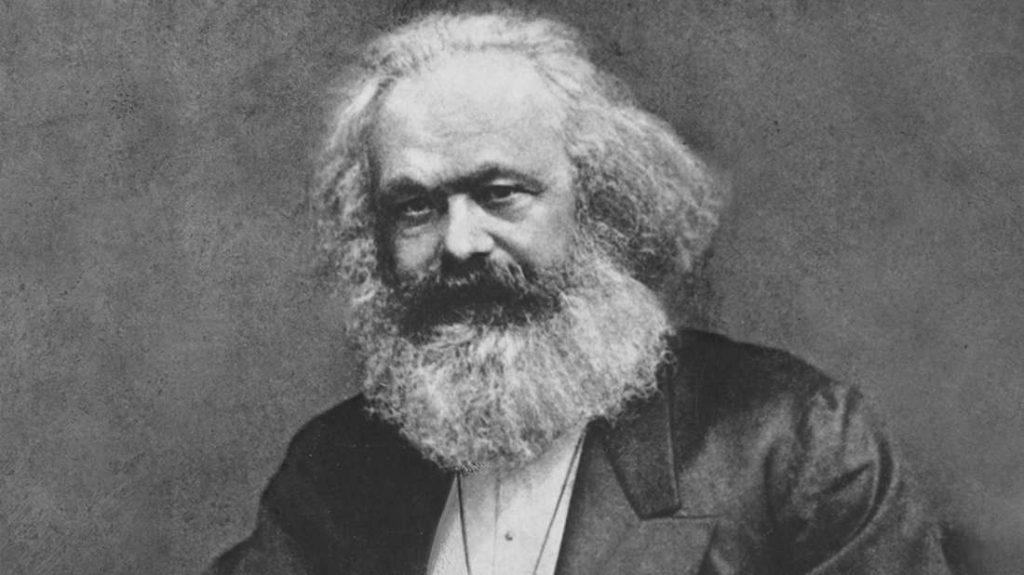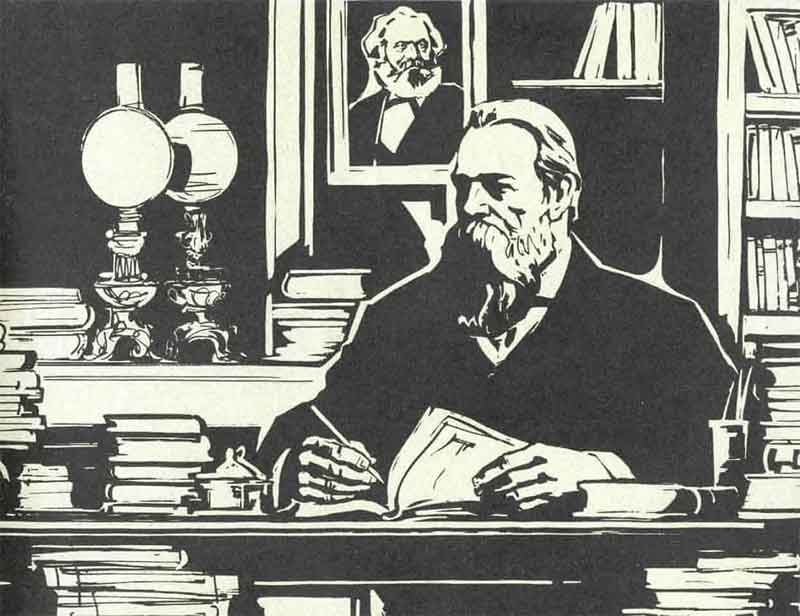
“It is true that Marx did not believe in drawing up recipes for the cookshops of the future, but he did describe the basis of the society he thought was going to replace capitalism: “an association of free men, working with the means of production held in common” (chapter 1 of Capital); “a co-operative society based on the common ownership of the means of production” (Critique of the Gotha Programme); “abolition of private property”, “the Communistic abolition of buying and selling”, “the conversion of the functions of the State into a mere superintendence of production” (Communist Manifesto); “abolition of the wages system” (Value, Price and Profit). In short, a classless, stateless, moneyless, wageless society based on the common ownership of the means of production.” – cited by Adam Buick, Socialist Standard, November 2012
“Every atom of surplus value and capital, for Marx, is the result of theft. The issue is slavery – not the level of slave rations. In short, reform of capitalism is not the answer. Marx was unequivocal: capitalism must be ended.” – Beyond Capital, Marx’s Political Economy of the Working Class, Michael A. Lebowitz
Abolition of the wages system
In Wage Labour and Capital, Marx epitomized the condition of existence of capitalism: “… capital presupposes wage labour; wage labour presupposes capital. They condition the existence of each other; they reciprocally bring forth each other.” (Progress, Moscow 1985, p. 31) He defines wages as three categories: “nominal wages”, that is, the sum of money for which the worker sells himself/herself to the capitalist; “real wages”, that is, the sum of commodities which he/she can buy for this money; and “comparative, relative wages” that “express the share of direct labour in the new value it has created in relation to the share which falls to accumulated labour, to capital (p. 34) … within the relation of capital and wage-labour, the interests of capitals and the interests of wage-labour are diametrically opposed to each other. A rapid growth of capital is synonymous with a rapid growth of profits. Profits can grow rapidly only when the price of labour – the relative wages – decrease just as rapidly. Relative wages may fall, although real wages rise simultaneously with nominal wages, with the money value of labour, provided only that the real wage does not rise in the same proportion as the profit. If, for instance, in good business years wages rise 5 per cent, while profits rise 30 per cent, the proportional, the relative wage has not increased, but decreased.” (p. 36-7) – http://www.marxists.org/archive/marx/works/1847/wage-labour/ch08.htm
Actually, the share of the global collective working class, vis-à-vis that of the global collective capitalist class, is constantly diminishing at an enormously and growingly faster rate than ever before, even though real wages in the modernized sectors are going up – although the richer have been the crumbs that fall to the lot of these workers.
In Capital Vol 1, ch 25, Marx brilliantly brings out the defining characteristic of capitalist production as follows:
“A larger part of their [working class’s] own surplus-product, always increasing and continually transformed into additional capital, comes back to them in the shape of means of payment, so that they can extend the circle of their enjoyments; can make some additions to their consumption-fund of clothes, furniture, &c., and can lay by small reserve funds of money. But just as little as better clothing, food, and treatment, and a larger peculium, do away with the exploitation of the slave, so little do they set aside that of the wage worker. A rise in the price of labour, as a consequence of accumulation of capital, only means, in fact, that the length and weight of the golden chain the wage worker has already forged for himself, allow of a relaxation of the tension of it. In the controversies on this subject the chief fact has generally been overlooked, viz., the differentia specifica [defining characteristic] of capitalistic production. labour power is sold today, not with a view of satisfying, by its service or by its product, the personal needs of the buyer. His aim is augmentation of his capital, production of commodities containing more labour than he pays for, containing therefore a portion of value that costs him nothing, and that is nevertheless realised when the commodities are sold. Production of surplus-value is the absolute law of this mode of production. Labour power is only saleable so far as it preserves the means of production in their capacity of capital, reproduces its own value as capital, and yields in unpaid labour a source of additional capital. The conditions of its sale, whether more or less favourable to the labourer, include therefore the necessity of its constant re-selling, and the constantly extended reproduction of all wealth in the shape of capital.” – http://www.marxists.org/archive/marx/works/1867-c1/ch25.htm
According to Marx, the worker furnishes surplus-value “without having the fair price of his commodity cut by even a farthing” (Capital, Vol. I). The whole product, including the surplus, “becomes the legitimate property of the capitalist” (ibid.). Indeed: “The time during which the worker works is the time during which the capitalist consumes the labour-power he has bought from him. If the worker consumes his disposable time for himself, he robs the capitalist.” (ibid, Chapter Ten)
And, “wages and private property are identical … An enforced increase of wages (disregarding all other difficulties, including the fact that it would only be by force, too, that such an increase, being an anomaly, could be maintained) would therefore be nothing but better payment for the slave, and would not win either for the worker or for labor their human status and dignity.” – Marx, Economic and Philosophic Manuscripts of 1844, CW, Vol. 3, Progress, Moscow 1975, p. 280 – http://www.marxists.org/archive/marx/works/1844/manuscripts/labour.htm
It is for this reason that Marx urged on the working class: “‘At the same time, and quite apart from the general servitude involved in the wages system, the working class ought not to exaggerate to themselves the ultimate working of these everyday struggles. They ought not to forget that they are fighting with effects, but not with the causes of those effects; that they are retarding the downward movement, but not changing its direction; that they are applying palliatives, not curing the malady. They ought, therefore, not to be exclusively absorbed in these unavoidable guerilla fights incessantly springing up from the never ceasing encroachments of capital or changes of the market. They ought to understand that, with all the miseries it imposes upon them, the present system simultaneously engenders the material conditions and the social forms necessary for an economical reconstruction of society. Instead of the conservative motto, ‘A fair day’s wages for a fair day’s work!” they ought to inscribe on their banner the revolutionary watchword, ‘Abolition of the wages system!‘” (Karl Marx, Value, Price and Profit, 1865). – http://www.marxists.org/archive/marx/works/1865/value-price-profit/ch03.htm#c14
The class struggle never ceased since the division of society into classes. It’s built-in to capitalism. It exists as long as capitalism exists owing to the existence of classes.
Binay Sarkar is a retired college teacher














































